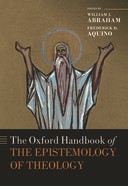 The Oxford Handbook of the Epistemology of Theology
The Oxford Handbook of the Epistemology of Theology
Contents
-
-
-
-
-
-
-
-
-
-
-
-
-
-
Introduction Introduction
-
Ecclesial Practices in Recent Epistemology of Religion Ecclesial Practices in Recent Epistemology of Religion
-
MacIntyrean Practices MacIntyrean Practices
-
An Example MacIntyrean Practice: Engineering An Example MacIntyrean Practice: Engineering
-
MacIntyre’s Definition MacIntyre’s Definition
-
-
Ecclesial Practices and Epistemic Transformation Ecclesial Practices and Epistemic Transformation
-
Conclusion Conclusion
-
Acknowledgements Acknowledgements
-
References References
-
Suggested Reading Suggested Reading
-
-
-
-
-
-
-
-
-
-
-
9 Ecclesial Practices
Get accessColin M. McGuigan is a doctoral student in the Department of Religious Studies at the University of Dayton, Ohio.
Brad J. Kallenberg is Professor of Theology at the University of Dayton in Ohio.
-
Published:06 July 2017
Cite
Abstract
This chapter uncovers a development of ideas extending from the thought of Alvin Plantinga through William Alston to Nicholas Wolterstorff. It highlights in this conceptual trajectory the crucial role that ‘practice’ plays in training cognizers for knowing in general, and religious knowing in particular. After illustrating the importance Alasdair MacIntyre’s notion of ‘practice’ has for tacit knowing in a non-religious domain, the chapter argues for the plausibility that ecclesial practices play an analogous role for training religious knowers to perceive truthfully. It concludes by showing the similarity of this position to what philosophical theologian Sarah Coakley and others have recently dubbed the ‘spiritual sense tradition’.
Sign in
Personal account
- Sign in with email/username & password
- Get email alerts
- Save searches
- Purchase content
- Activate your purchase/trial code
- Add your ORCID iD
Purchase
Our books are available by subscription or purchase to libraries and institutions.
Purchasing information| Month: | Total Views: |
|---|---|
| October 2022 | 3 |
| November 2022 | 4 |
| December 2022 | 14 |
| January 2023 | 4 |
| February 2023 | 10 |
| March 2023 | 11 |
| April 2023 | 3 |
| May 2023 | 2 |
| June 2023 | 8 |
| July 2023 | 4 |
| August 2023 | 7 |
| September 2023 | 3 |
| October 2023 | 10 |
| November 2023 | 6 |
| December 2023 | 6 |
| January 2024 | 6 |
| February 2024 | 5 |
| March 2024 | 4 |
| April 2024 | 11 |
| May 2024 | 4 |
| June 2024 | 7 |
| July 2024 | 5 |
| August 2024 | 4 |
| September 2024 | 2 |
| October 2024 | 3 |
| November 2024 | 1 |
| December 2024 | 5 |
| February 2025 | 8 |
| March 2025 | 11 |
| April 2025 | 1 |

Get help with access
Institutional access
Access to content on Oxford Academic is often provided through institutional subscriptions and purchases. If you are a member of an institution with an active account, you may be able to access content in one of the following ways:
IP based access
Typically, access is provided across an institutional network to a range of IP addresses. This authentication occurs automatically, and it is not possible to sign out of an IP authenticated account.
Sign in through your institution
Choose this option to get remote access when outside your institution. Shibboleth/Open Athens technology is used to provide single sign-on between your institution’s website and Oxford Academic.
If your institution is not listed or you cannot sign in to your institution’s website, please contact your librarian or administrator.
Sign in with a library card
Enter your library card number to sign in. If you cannot sign in, please contact your librarian.
Society Members
Society member access to a journal is achieved in one of the following ways:
Sign in through society site
Many societies offer single sign-on between the society website and Oxford Academic. If you see ‘Sign in through society site’ in the sign in pane within a journal:
If you do not have a society account or have forgotten your username or password, please contact your society.
Sign in using a personal account
Some societies use Oxford Academic personal accounts to provide access to their members. See below.
Personal account
A personal account can be used to get email alerts, save searches, purchase content, and activate subscriptions.
Some societies use Oxford Academic personal accounts to provide access to their members.
Viewing your signed in accounts
Click the account icon in the top right to:
Signed in but can't access content
Oxford Academic is home to a wide variety of products. The institutional subscription may not cover the content that you are trying to access. If you believe you should have access to that content, please contact your librarian.
Institutional account management
For librarians and administrators, your personal account also provides access to institutional account management. Here you will find options to view and activate subscriptions, manage institutional settings and access options, access usage statistics, and more.